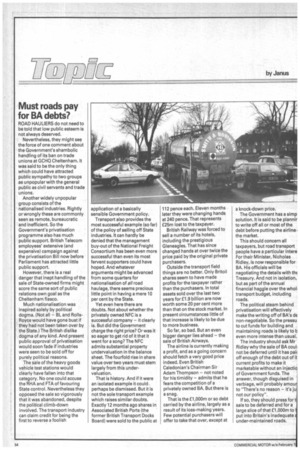Must roads pay for BA debts?
Page 56

If you've noticed an error in this article please click here to report it so we can fix it.
ROAD HAULIERS do not need to be told that low public esteem is not always deserved.
Nevertheless, they might see the force of one comment about the Government's shambolic handling of its ban on trade unions at GCHQ Cheltenham. It was said to be the only thing which could have attracted public sympathy to two groups as unpopular with the general public as civil servants and trade unions.
Another widely unpopular group consists of the nationalised industries. Rightly or wrongly these are commonly seen as remote, bureaucratic and inefficient. So the Government's privatisation programme also has much public support. British Telecom employees' extensive (and expensive) campaign against the privatisation Bill now before Parliament has attracted little public support.
However, there is a real danger that inept handling of the sale of State-owned firms might score the same sort of public relations own goal as the Cheltenham fiasco.
Much nationalisation was inspired solely by political dogma. (Not all — BL and RollsRoyce would have gone bust if they had not been taken over by the State.) The British dislike dogma of any kind. And present public approval of privatisation would soon fade if industries were seen to be sold off for purely political reasons.
The sale of the heavy goods vehicle test stations would clearly have fallen into that category. No one could accuse the RHA and FTA of favouring State control. Nevertheless they opposed the sale so vigorously that it was abandoned, despite the political climb-down involved. The transport industry can claim credit for being the first to reverse a foolish application of a basically sensible Government policy.
Transport also provides the most successful example (so far) of the policy of selling off State industries. It can hardly be denied that the management buy-out of the National Freight Consortium has been even more successful than even its most fervent supporters could have hoped. And whatever arguments might be advanced from some quarters for nationalisation of all road haulage, there seems precious little point in having a mere 10 per cent by the State.
Yet even here there are doubts. Not about whether the privately owned NFC is a successful company — it clearly is. But did the Government charge the right price? Or was it so eager to get rid of it that it went for a song? The NFC admits substantial property undervaluation in the balance sheet. The fourfold rise in share value over two years must stem largely from this undervaluation.
That is history. And if it were an isolated example it could . perhaps be dismissed. But it is not the sole transport example which raises similar doubts. Exactly 12 months ago shares in Associated British Ports (the former British Transport Docks Board) were sold to the public at 112 pence each. Eleven months later they were changing hands at 240 pence. That represents £25m lost to the taxpayer.
British Railway was forced to sell a number of its hotels, including the prestigious Gleneagles. That has since changed hands at over twice the price paid by the original private purchasers.
Outside the transport field things are no better. Only Britoil shares seem to have made profits for the taxpayer rather than the purchasers. In total assets sold over the last two years for £1.9 billion are now worth some 20 per cent more than that on the stock market. In present circumstances lithe of that increase is likely to be due to more business.
So far, so bad. But an even bigger danger lies ahead — the sale of British Airways.
The airline is currently making a profit, and as a going concern should fetch a very good price indeed. Even British Caledonian's Chairman Sir Adam Thompson — not noted for his timidity — admits that he fears the competition of a privately owned BA. But there is a snag.
That is the £1,000m or so debt carried by the airline, largely as a result of its loss-making years. Few potential purchasers will offer to take that over, except at a knock-down price.
The Government has a simp solution. It is said to be plannir to write off all or most of the debt before putting the airline the market.
This should concern all taxpayers, but road transport people have a particular intere For their Minister, Nicholas Ridley, is now responsible for BA. His officials will be negotiating the details with tht Treasury. And not in isolation, but as part of the annual financial haggle over the whof transport budget, including roads.
The political steam behind privatisation will effectively make the writing off of BA's dE non-negotiable. So the pressu to cut funds for building and maintaining roads is likely to b even more intense than usual.
The industry should ask Mr Ridley why the sale of BA coul, not be deferred until it has paic off enough of the debt out of it current profits to make it marketable without an injectio of Government funds. The answer, though disguised in verbiage, will probably amour to "There's no reason — it's ju not our policy".
If so, they should press for t sale to be deferred and for a large slice of that £1,000m to put into Britain's inadequate -8 under-maintained roads.




















































































